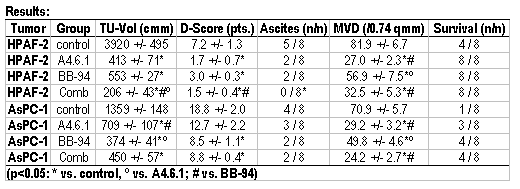# 105705 Abstract ID: 105705 Evaluation of VEGF Blockade and MMP Inhibition as a Combination Therapy for Experimental Human Pancreatic Cancer.
Hubert G Hotz, Oscar J Hines, Birgit Hotz, Thomas Foitzik, Heinz J Buhr, Howard A Reber, D-12200 Berlin, Germany; Los Angeles, CA
Background: Blockade of the proangiogenic vascular endothelial growth factor (VEGF) and inhibition of matrix metalloproteinases (MMP) are promising novel treatment strategies for cancer. The aim of this study was to assess the effects of a neutralizing anti-VEGF antibody (A4.6.1) and a MMP inhibitor (BB-94) on pancreatic cancer (PaCa) in-vivo in an orthotopic nude mouse model. Methods: Five million cells of 2 human PaCa cell lines (AsPC-1 / poorly differentiated, HPAF-2 / moderately differentiated) were injected sc. into nude mice. One cubic mm fragments of the resulting sc. tumors were implanted into the pancreas of other mice. Animals were randomized into control and 3 treatment groups: A4.6.1 (100 µg ip., twice weekly), BB-94 (50 mg/kg, every other day) and Comb (A4.6.1 + BB-94). Treatment started 3 days after tumor induction and was continued for 14 weeks or until death of the mice. Volume of the primary tumor (TU-Vol), local infiltration and metastatic spread (dissemination score: D-Score), and ascites were determined at autopsy. Tumor sections were H&E stained for histopathologic analysis. Microvessel density (MVD) as a parameter of neoangiogenesis was analyzed in CD31-stained tumor sections. Results: table. Conclusions: Both VEGF blockade and MMP inhibition reduce primary tumor size, metastasis, and angiogenesis, thereby increasing survival in experimental pancreatic cancer. Combination of the two treatment modalities results in additive effects at least in moderately differentiated HPAF-2 tumors.

|
 500 Cummings Center
500 Cummings Center +1 978-927-8330
+1 978-927-8330
 +1 978-524-0461
+1 978-524-0461